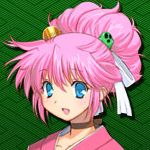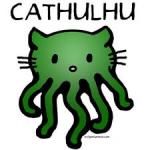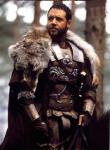Erikson writes good. Take any random page or paragraph from this book, and it is great. I don't think there was any flaws in the actual writing here. Each scene or sections on its own merits is great, but putting it all together just did not work for me. And that's fine - not everyone likes the same things and if I was bored by the philosophical meanderings I know there's plenty of people out there who loved it. But overall I think this book really suffered a lot from being very repetitive in a few ways.
The biggest repetitiveness I found was with the scenes. So much of it seemed to be a group of people moving from point A to point B. We've got scenes of Draconus' group travelling west, then Drac and Arathan moving south and the borderswords back east. Faror traveling with T'riss, then the Shake guys traveling with T'riss. Sandalath traveling in a carriage. Orfantal traveling with a caravan, then alone, then with Gripp. Cryl is feeling blue? Better go traveling in the hills to meet up with Scara who is traveling south, but then Cryl better hurry up and travel back home so the wedding procession can start traveling along the road, only for Cryl to head back to the estate, then jump on a new horse and head back towards Andarist's estate by a different route. And if you're not traveling somewhere, you're standing on a tower - whether it be the priests and historian on the tower in the Citadel (this one happens 3 or 4 times), or Sandalath on the tower watching Draconus' houseguards fight, or Korya putting dolls out on her tower, or the random historian at Abara in her tower...
And then to mix up all this traveling and tower-standing, we need to have some violence! So, the Legion burns down Orfantal's grandmother's keep, brutally killing the servants and raping the maid. The Legion also burns and pillages through Denier camps, the remains of which are seen a couple times, especially Kadaspala noting how the Legion members brutally killed the men and raped the women. The Legion tops it all off with brutally killing Ensedia's guards, father and friend, then raping her and her maid, too. There's also some other scenes featuring the Legion where women don't get raped, such as Risp and her sergeant brutally killing a pregnant woman and her two daughters in Abara. (On a side note, the sheer quantity/insistence of the rapings was probably a huge factor in me losing the will to get through this book, and has dampened my eagerness for future books... hasn't SE hit us in the face with that one enough by now?)
So yeah, I found a lot of the scenes to be pretty repetitive, but obviously the setting doesn't matter if the specific plots/dialogue/narrative make those scenes important in different ways, right? Right, but I found that pretty repetitive, too. The two big love triangles are almost the same - [Enesdia/Faror] is betrothed to the elder, powerful [Andarist/Tulas] but is conflicted because she really loves her pseudo-family member [Cryl/Spinnock] Durav (since Kadaspala barely spends anytime with Enesdia his feelings hardly affect the love triangle). Whether it be Calat Hustain, Anomander, Emral, Toras Redone, etc etc everyone in any sort of military or political position has scenes where they note that the Legion seems to be out of control, pretending to be Deniers is a stupid ruse, Urusander's views are unknown, Huun Raal is a viper who should be killed, and then faces some indecision of how to deploy themselves.
Of course, there were some unique scenes in there, too, and most of those turned out very nice, but so much of it was drowned in this small handful of repeating set pieces that at any given time most of the plots seemed to be going nowhere.
More subjectively, I also found the characters and narrative to repeat themselves a lot in their philosophical musings, as well as their thoughts and reactions. After I finished the novel, I tried flipping to a couple random pages. Several times I landed right in the middle of some deep contemplation of the human condition, which is okay, but each time I could not figure out what PoV I was following until it explicitly told me something plot-related. There really did not seem, to me, to be a difference in voices and ideas between the thoughts of Rint, Kadaspala, Emral, Rise and Kellaras.
Now, there is the prelude which gives the possibility of the tale being related by Gallan or Fisher, but that doesn't work for me. Unlike Kruppe in TtH relating the darujhistan sections, there did not seem to be a unifying voice here and the narration was all plain, giving no hint of an intended voice behind it. So I won't take that as a justification for the characters all seeming to think the same.
Putting the repetitiveness of plot and philosophizing together, here, I think the big problem is that FoD is too unified for its length and scope. If you look at any book in the MBotF, you have lots of very different storylines, far apart, with very different themes. Here in FoD, the plots and PoVs are so similar because they are all pushing the same (set of) theme(s). I'm not so great at concretely identifying themes, but you can see easily how every PoV and plot has issues of family, how they all deal with the horrors and miscommunications of war, and how they all have reflections on honour, justice and equality. Repeating every one of these themes in every plotline and with a dozen characters made this book, for me, a slog, which I think would not have happened if they were spread out amongst instead.
Part #2 is vagueness. The previously mentioned repetitiveness makes the intensity of the book fall very flat, and the lack of much of a climax keeps it there. From start to end, there are few moments that raise the suspense or drama much, because they are so similar to previous scenes. The scenes that are unique and should be triumphant mini-climaxes or filled with suspense fail to get much of a rise from me because they are all so vague.
T'riss has an audience with Mother Dark and we don't see it, and in the aftermath all we get is that she somehow sanctified the Citadel. What does that even mean? The priests and priestesses lead worship and a religion of MD before this "sanctification", and afterwards they... keep doing that. The High Priestess was in the room with T'riss, but the same doubts and questions assail her before and after. The only difference is Syntara leaving, the room being darker and people's skin changing, but none of it is given any meaning (though we obviously know what/where Syntara is going).
Then later on we've got Rake arguing with MD a few times and every time MD just makes cryptic statements and Rake just shouts at her frustratedly. The only concrete statement ever said between them is something we already know, when Grizzin Farl talks about the Azathanai and Rake realizes what Draconus is.
Then we've got vague references to MD standing upon the spar of Andii and looking down, and Draconus later delivers the Terondai which will make the gate of Kurald Galain and MD is scared... but we don't know why she's scared or what the Terondai are doing (making KG into a warren of some sort, obviously, but there's dozens of ways that could be happening with maior differences) and whether this gate is being made anew or already existed and is being given, nor whether this darkness already existed in some sort of other realm that it is a gate to or not, etc etc etc...
Otherwhere, we have plenty of one-offs like Glimmer Fate stopping the Vitr for an unknown one of dozens of reasons, Burn sitting in a cave having 0 impact on the story, the Errant arbitrarily needing to murder Jaghut to create what may become tiles (though the first was completely different), etc etc
These things don't come off too bad for those of us who have read MBotF, because we know all about warrens, about what things are going to end up like, who Burn is, etc... and even then I found everything with MD incredibly frustrating. For someone who has never read MBotF, all these little things tossed in are going to either be discarded immediately or be helplessly confusing. There is nothing in the Burn scene for someone who hasn't heard of her in MBotF. The scene about Varandas' dolls is so vague, someone who doesn't know what Nachts and Bolead are going to become can't possibly understand what these dolls can do. MD's power going from regular darkness, to skin-changing colder darkness, to big expanding wave of darkness brought by Draconus is meaningless. I really think these things needed to be written with bigger impact. Less words about Emral being confused and more words about the growing wave of darkness blotting out the sun and turning everything into azure glows, or something...
It might seem at this point that I'm going to call the book good, but not good for non-Malazan-fans-already. Unfortunately, no...
Here's the thing. This book is in no way bad. Sure, I found a lot of it tedious, but not in a way that there is anything wrong with it. I don't have significant complaints about anything directly within this book. Taken entirely by itself, I think it's fine, just not all that great.
I do, though, have problems with what this book invalidates from MBotF...
Since the book is the first of a trilogy, I'll have to wait on the next two before making a decision on some of these things. The whole genealogy of many characters, certain possible timeline issues, etc, are all fine for now and we just have to trust in SE. Others though, mostly characterization issues, are already foregone.
Let's take Caladan Brood. Suddenly he is now an Azathanai, potentially equal to Draconus, Olar Ethil, K'rul, etc. Going back to MoI now, why was he so phased by the notion of K'rul being among his army? He should be pulling out some ale and congratulating his long lost Azathanai brother on returning. And now his great ordeal of getting Burn's Hammer and making the great choice is trivialized - as a mortal(ish) Ascendant it showcased a great deal of the morality of mortals vs gods and his struggles with the choice were believable and emotional. Now he's a being that could be even more powerful than Burn and if he does swing the hammer, he could just recreate all the races he wants himself from the Vitr. Any sense of humility and the idea that he would have needed to spend a great deal of time exploring himself to come to grips with the choice facing him... well all of that seems ruined now.
Another example would be The Errant. In MT, The Errant was not necessarily likeable, but he seemed to be very neutral and non-offensive. His bad was matched by his good, and even his bad had logical reasons behind it. In RG and onwards, he's not so nice, but there is a continuous issue of whether that is his true self or whether he has been corrupted by the touch of the demonic sea god, as Kuru Qan warned. Even when he is being vile, he occassionally displays extreme remorse, making you wonder how much control he has, or whether he is to some extent trapped in his own aspect. Now we have FoD, which straightforwardly shows us that even when young (for an Azathanai, I guess), Errastas was always a colossal asshole and evil-cacklingly ambitious. So all complexity of character is gone and when reading MT, RG, DoD or TCG the response to anything he ever does will just be "because he is a giant asshat".
Lastly, and most importantly, are the Tiste themselves. Individually, it doesn't much matter at all. You can make teenage Osserc a shy wallflower, a brazen outlaw or anything else - all these Tiste are so young compared to their ages in MBotF that you can excuse any change in personality from now until then. But the Tiste on a whole, is another matter. The Tiste in FoD are mostly younger than a century, and it seems none can ever live past about a score centuries, and few reach anywhere near that. This is very, very different from the Tiste Andii in GotM and MoI, who must be hundreds of thousands of years old. The biggest characteristic of them then was how world-weary they all were, which made perfect sense. Maybe not everyone agrees, or maybe it is just the philosophizing, but many of the Tiste in FoD seemed to me to have the same depressing and pessmistic views of society, justice and the "human" condition. And that is awful, because it invalidates the whole reason for why the Tiste are so different in MBotF. A joke about Seren Pedac's Bluerosian ex-boyfriend is no longer "Haha, that's funny because she doesn't get that he's millenia old" and is now "That's not all that funny, it's just that Tiste are always emo."
If we're going to see the civilization of 300 000-year old cynical people, I expected it to be a lot more vibrant and actually have some Tiste enjoying their lives, because that would actually be a contrast to the future Tiste. Instead it just felt like more of the same. Or, in a word, repetitive - see above...
This post has been edited by D'rek: 02 January 2013 - 05:01 PM

 Help
Help

















